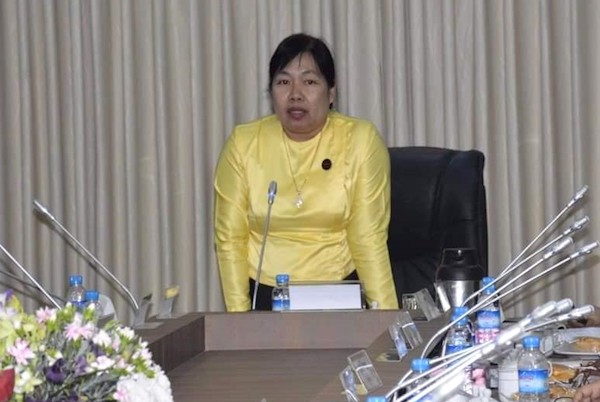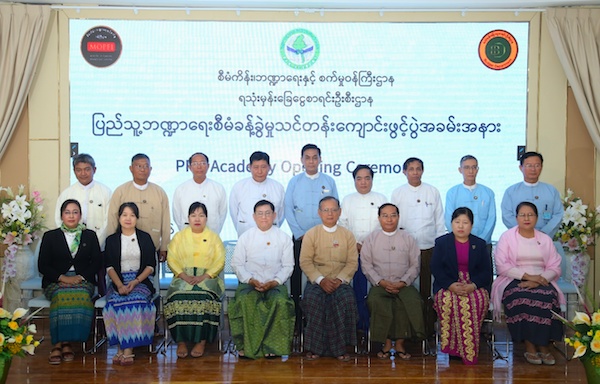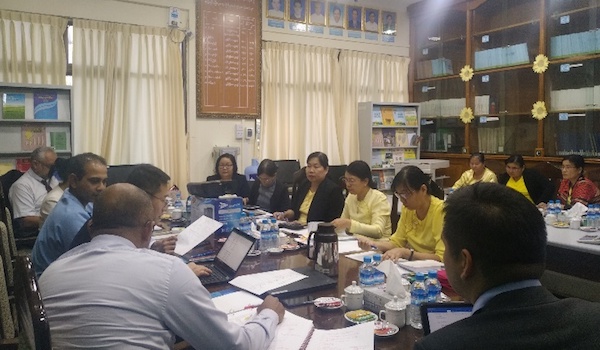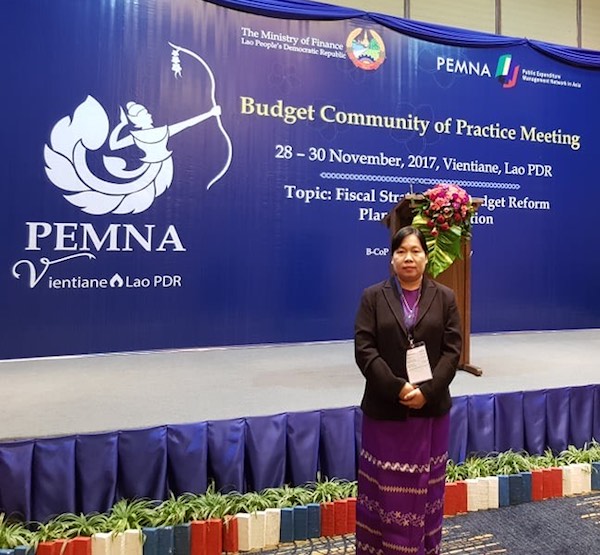![image001[1]](/cms/wp-content/uploads/2020/05/image0011.jpg) Thida Tun
Thida Tun
Director General
Budget Department
Ministry of Planning, Finance and Industry, Myanmar
Transition Economy Program (MA ’04)
Please tell us about your career path so far. What is your area of specialization and how did you come to work in this area?
I graduated with a bachelor’s degree, with a major in Commerce, from Yangon Institute of Economics in 1985. I started my career in the Ministry of Industry where I worked for about two years, before joining the Budget Department in 1988 where I have been ever since. My first assignment was in the Foreign Exchange section and later I was assigned to the Budget section where I worked for several years.
You are currently serving as Director General of the Budget Department in Ministry of Planning, Finance and Industry. What are your main roles and responsibilities?

Mrs. Thida Tun delivering an opening speech at the Department meeting
I was appointed Director General of the Budget Department in the Ministry of Planning, Finance and Industry in March 2019. I am responsible for formulating and implementing fiscal policy, public finance management and monitoring government budget. Moreover, as secretary of Modernization of Public Financial Management Project Executive Reform Team, I am playing a leading role in Public Financial Management reform in Myanmar. Myanmar Modernization of Public Finance Management (PFM) Project has been implemented in Myanmar since 2014, in collaboration with the World Bank, to support the strengthening of Myanmar’s PFM systems and institutions, and improving policy formulation and implementation for effective, efficient and accountable delivery of public services. In addition, I act as Macroeconomic Management Sector Coordination Group leader, Management Committee member of Public Financial Management Academy, and leader, secretary and member in various inter-ministerial committees dealing with projects and development.
In your current capacity, what do you see as the main opportunities and challenges for Myanmar over the course of the next five to ten years?
The main opportunities are economic stability and strengthened macroeconomic management through Public Financial management (PFM) reform and to reach international standards in the long term.

Mrs Thida Tun at the opening ceremony of the Public Financial Management Academy
Although we are making good progress in certain areas some major challenges remain, including the need to update and enact the legal framework, the occurrence of a budget deficit, the need to develop effective intergovernmental fiscal management, the need to develop adequate fiscal oversight and reforms, and inadequate infrastructure and sustainable capacity development.
What are some of the biggest challenges you face in your work? And what have been the most interesting or rewarding aspects of your career thus far?

Mrs Thida Tun leading the discussion with Article IV IMF mission
One of the biggest challenges I face in my work is the lack of appropriate rules, regulations, manuals and guidelines and the need for a well-developed framework within which we can formulate and implement our policies. Another big challenge is the inadequacy of manpower and techniques.
The most interesting aspects are working on ways to improve the policy and procedures of financing deficit, to reduce the burden of pension benefits on the Union Budget, and developing an efficient and effective budget management system
What led you to GRIPS? What was the most important thing you learned while here and how has your experience at GRIPS prepared you for future endeavours?
As a civil servant it was a great opportunity for me. I returned to the Ministry of Finance, Myanmar after my graduation from GRIPS. The knowledge that I acquired during my study at GRIPS has helped me to contribute to my work in an efficient and effective manner. GRIPS has given me confidence and I hope that I can serve as the best civil servant during the rest of my professional career.
Have you had any involvement, professional or otherwise, with Japan since your graduation?
I had a chance to participate in some seminars and conferences organized by MOF, JICA, and ADBI in Tokyo. Recently, in February 2020, I participated in the JICA/IMF conference on “Achieving Inclusive and Sustainable Growth with Sound Fiscal Management” in Tokyo. All seminars and conferences have contributed to my knowledge on international experience in fiscal policy and macroeconomic management and reflect my professional endeavors.
How do you maintain a balance between your work and the rest of your life? And what is your favorite thing to do when you are not working?

At the Public Expenditure Management Network in Asia (PEMNA) meeting in Lao PDR, November 2017
I am quite busy working as a Director General of the Budget Department. It is not easy to maintain a balance between personal life and work but I am trying to support my family members as much as I can and at the same time be successful in my working life.
What are some of your fondest memories of your time spent at GRIPS? And what do you miss about Japan?
I really enjoyed staying at the Tokyo International Exchange Center (TIEC) in Odaiba, and enjoyed the cherry blossoms in the campus backyard every spring. I also miss my friends, classmates, professors and staff of the Student Office. I always miss Japanese traditions, culture, and food which I wish to enjoy more often in Japan.
If you could give one piece of advice to anyone considering studying at GRIPS what would it be?
As a past student of GRIPS, my advice to the current and future students would be that you should not only concentrate on the academic courses, but also learn as much as possible about Japanese society, culture, and life style as well as their successful experience in economic development.
How would you like to maintain involved with the School? What do you expect from GRIPS as an alumnus and do you have any suggestions on how to further utilize the GRIPS alumni network?
The GRIPS alumni association is an excellent network of alumni that encourages people to be united and stand together. I wish the alumni association to be successful and that alumni will support each other in their future endeavors for many years to come.





